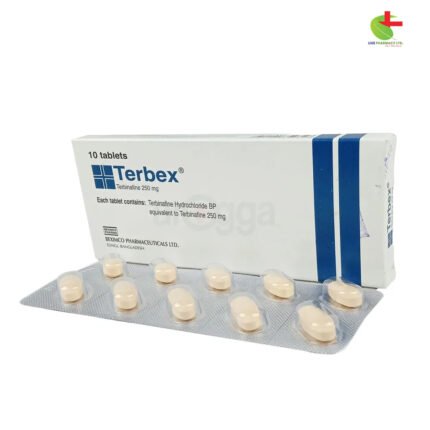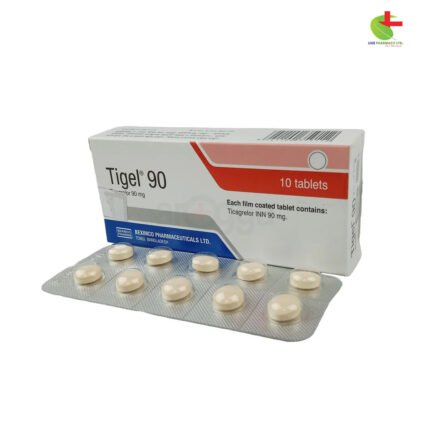Tibilon 2.5
603.68৳ Strip
- Tibolone is a synthetic steroid for managing menopausal symptoms and preventing osteoporosis in postmenopausal women.
- It features estrogenic, progestogenic, and androgenic effects to alleviate hot flashes, vaginal dryness, and bone loss.
- Administered as a daily tablet, Tibolone helps relieve menopause-related symptoms and supports bone health.
 Brand
Brand
|
Beximco Pharmaceuticals Ltd |
|---|---|
 Generics
Generics
|
Tibolone |
 Type
Type
|
Tablet |
Indications
Tibolone is utilized to address symptoms associated with natural or surgical menopause in postmenopausal women. It is also employed to prevent osteoporosis in women who have undergone menopause and are at high risk of fractures but cannot use other osteoporosis-preventive medications.
Pharmacology
Tibolone is a synthetic steroid with estrogenic, androgenic, and progestogenic properties. After oral administration, it is swiftly converted into three active metabolites that contribute to its therapeutic effects. Two metabolites (3α−OH and 3β−OH) primarily exhibit estrogenic activity, while the δ4-isomer and the parent compound display progestogenic and androgenic effects. Tibolone compensates for decreased estrogen production in postmenopausal women, alleviates menopausal symptoms, and helps prevent bone loss after menopause or ovariectomy. It provides estrogenic benefits to the vagina, bones, and thermoregulatory centers in the brain, reducing hot flashes and improving vaginal dryness and atrophy. Additionally, it positively affects mood and libido.
Dosage & Administration
- Standard Dose: One Tibolone tablet (2.5 mg) per day. The tablet should be ingested with water or another beverage, preferably at the same time each day. Symptom improvement typically begins within a few weeks, with optimal results usually seen after a minimum of 3 months of continuous use.
- Starting Tibolone: For women experiencing natural menopause, Tibolone should be initiated at least 12 months after their last natural menstrual period. For those undergoing surgical menopause, treatment may begin immediately.
- Switching from HRT: If transitioning from a sequential HRT regimen, start Tibolone the day after completing the previous treatment. If switching from a continuous-combined HRT, Tibolone can be started at any time.
- Missed Dose: If a dose is missed, take it as soon as remembered unless it has been over 12 hours. In that case, skip the missed dose and continue with the next scheduled dose. Missing doses may lead to breakthrough bleeding or spotting.
Interactions
While no specific drug interactions with Tibolone have been reported, it is theoretically possible that enzyme-inducing medications such as barbiturates, carbamazepine, hydantoins, and rifampicin may increase Tibolone metabolism, potentially reducing its effectiveness. Tibolone may also enhance the effects of anticoagulants due to its impact on blood and fibrinolytic activity.
Contraindications
Tibolone is contraindicated during pregnancy and lactation, and in individuals with known or suspected hormone-dependent tumors, cardiovascular or cerebrovascular disorders, active deep vein thrombosis, thromboembolic disorders, unexplained vaginal bleeding, and severe liver disorders.
Side Effects
Possible side effects include occasional vaginal bleeding or spotting, especially in the initial months of treatment. Other adverse effects may include headache, migraine, edema, dizziness, itching, weight gain, nausea, abdominal pain, rash, and depression.
Pregnancy & Lactation
Tibolone is contraindicated during pregnancy. If pregnancy occurs while using Tibolone, discontinue the medication immediately. There is no available clinical data on its use during pregnancy. This medication is also contraindicated for breastfeeding women.
Precautions & Warnings
Use Tibolone with caution in individuals with renal impairment, a history of liver disease, epilepsy, migraine, hypercholesterolemia, impaired carbohydrate metabolism, diabetes mellitus, and cholestatic jaundice.
Overdose Effects
Tibolone has low acute toxicity in animals, so significant toxic effects are unlikely from an overdose. In case of acute overdose, symptoms may include nausea, vomiting, and withdrawal bleeding in females. Symptomatic treatment may be required.
Therapeutic Class
Medications for menopausal symptoms: Hormone Replacement Therapy
Storage Conditions
Store in a cool, dry place, protected from light. Keep out of reach of children.













Reviews
There are no reviews yet.